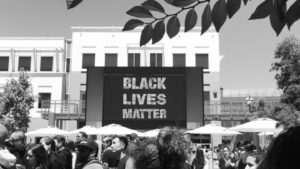
Facebook put up a large “Black Lives Matter” sign outside its headquarters following the deaths of Alton Sterling and Philando Castile. Image courtesy of Fusion.net
For many, the arrest of prominent Black Lives Matter activist DeRay Mckesson at a peaceful protest in Baton Rouge Saturday night was just another example of the over-policing that often occurs at such Black Lives Matter demonstrations.
Rather than speak up on the issue, leaders in the tech community saw Mckesson’s arrest as a golden opportunity for branding.
“Yes that is a @Twitter @blackbirds logo,” tweeted Salesforce CEO and billionaire Marc Benioff in reference to the activist’s Twitter t-shirt, which he was wearing at the time of his arrest. “Amazing to see tech as vehicle for social change. Respect.”
Benioff quickly deleted the tweet and apologized for his insensitive gaffe.
The following day, technology blog and news site Tech Crunch ran a story bearing the headline “Black Lives Matter activist DeRay McKesson arrested while Periscoping.” The article also featured a brief sidebar about the overly popular live-streaming app.
“Where would you explore, if you could teleport somewhere and be in somebody else’s shoes?,” it read. “You’ll be able to learn more about Periscope later this year. Please reach out to us if you’re interested in joining the team!”
Erica Joy Baker, a senior engineer at Slack and founding member of Project Include, said such shameless marketing and self-promotion is commonplace in the tech industry.
“That anyone could see a picture of a black man being arrested for protesting against the wrongful killing of another black man and respond ‘Hey look at the Twitter logo,’ would be mind-boggling if it happened anywhere else,” Baker said. “In the tech industry though, it’s par for the course.”
While tech industry products have created a new level of transparency in the advocacy of Black lives, those same corporate tech companies have continuously failed to increase diversity in their own workforce. According to a 2016 Wall Street Journal report on diversity in tech, Apple has a measly 6 percent of African-Americans employed in their technology sector while just 1 percent of Blacks hold leadership positions at Twitter.
This very contradiction is what has critics calling B.S. on Silicon Valley’s “support” for the Black Lives Matter movement.
“Silicon Valley doesn’t care about black people,” wrote former Facebook engineer Justin Edmund in a Medium post in response to the July 5 police killing of Baton Rouge man Alton Sterling. “It stands out just how mute Silicon Valley is when it comes to unarmed black people being shot and killed by cops.”
In the wake of several police shootings of African-American men, some tech companies, like Google and Twitter, have issued messages of concern about police brutality in America.
#AltonSterling and #PhilandoCastile’s lives mattered. Black lives matter. We need racial justice now. pic.twitter.com/mXTC0zRfqJ
— Google (@google) July 7, 2016
These tragedies must lead to action. We join the voices demanding racial justice now. #AltonSterling #PhilandoCastile
— Twitter (@twitter) July 8, 2016
According to The Guardian, music streaming company Spotify launched a unique Martin Luther King Jr.-inspired playlist, while traveling app Uber added a feature that changed car icons into peace signs and urged users to engage in a moment of reflection on gun violence as they waited for their drivers.
Many were appreciative of the tech industry’s support, but others expressed outright dissatisfaction with “Black Lives Matter” statements coming from companies with less than 5 percent of African-American employees.
Dear tech companies, putting a signage on your building or issuing a #blacklivesmatter statement does not give you a free pass on diversity
— Morgan DeBaun (@MorganDeBaun) July 10, 2016
Facebook: 2% Black.
Twitter: 2% Black.
Salesforce: 2% Black. pic.twitter.com/tfvS5ozn6U— Shanley (@shanley) July 10, 2016
lol uber has consistently refused to release diversity numbers so we already know what's going on over there https://t.co/wCSdOuH9cf
— Aminatou Sow (@aminatou) July 9, 2016
Amid concerns over the tech industry’s lack of diversity and ironic support of the Black Lives Matter movement are plans to launch a secretive internet kill switch app that would make it impossible for users to record live footage of police misconduct and/or protests on their smartphones.
According to Mint Press News, the Department of Homeland Security has a secretive procedure in place to de-activate internet access in the event of an emergency, better known as an “internet kill switch.” The Electronic Privacy Information Center has spearheaded efforts to reveal details of the controversial procedure through a series of open records requests. The non-profit has been unsuccessful, however, as the DHS denied their requests and the Supreme Court refused to hear their lawsuit earlier this year.
Critics are concerned the “kill switch” could potentially suppress citizens’ freedom of speech as they use their smartphones to record live footage during times of civil unrest.
“The American people are (once again) left in the dark regarding the inner-workings of another dangerous and intrusive government program,” wrote Derrick Broze in a January article for The Anti-Media. “It is only through the hard work of activists and groups like EPIC that we are at least aware of the existence of this program — but knowing bits and pieces about the protocol is not enough. In order to combat such heavy-handed measures, we need to have access to the government’s own documents. Hopefully, there is already a whistleblower preparing to release these details.”


